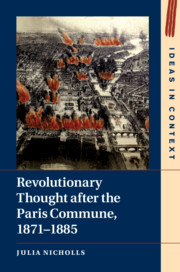Book contents
- Revolutionary Thought after the Paris Commune, 1871–1885
- Ideas in Context
- Revolutionary Thought after the Paris Commune, 1871–1885
- Copyright page
- Contents
- Acknowledgements
- Introduction
- Part I The Paris Commune and Accounting for Failure
- Chapter 1 The Commune as Quotidian Event
- Chapter 2 The Commune as Violent Trauma
- Part II Revolution and the Republic
- Part III Marx, Marxism, and International Socialism
- Part IV Empire and Internationalism
- Conclusion
- Bibliography
- Index
- Ideas in Context
Chapter 2 - The Commune as Violent Trauma
from Part I - The Paris Commune and Accounting for Failure
Published online by Cambridge University Press: 12 July 2019
- Revolutionary Thought after the Paris Commune, 1871–1885
- Ideas in Context
- Revolutionary Thought after the Paris Commune, 1871–1885
- Copyright page
- Contents
- Acknowledgements
- Introduction
- Part I The Paris Commune and Accounting for Failure
- Chapter 1 The Commune as Quotidian Event
- Chapter 2 The Commune as Violent Trauma
- Part II Revolution and the Republic
- Part III Marx, Marxism, and International Socialism
- Part IV Empire and Internationalism
- Conclusion
- Bibliography
- Index
- Ideas in Context
Summary
This chapter explores the second of two contemporary revolutionary interpretations of the Commune: the ‘violent’, which was mainly upheld by adherents of Louis Auguste Blanqui. These activists had held power during the Commune, and were more inclined to promote violent insurrection and state interventionism. This interpretation ignored the Commune’s ideas and its duration, focusing instead upon the shared experience of its violent end as part of an effort to turn Commune into a lasting revolutionary symbol and obscure the mistakes the Blanquists had made in power. Although this interpretation proved more enduring, it was not as beneficial as its ‘realist’ counterpart during the 1870s, because it was unable to characterise the Commune as anything more than a tragic event. I conclude by noting that while both readings were aimed at promoting unity, such competing interpretations also reflected the continuation of divisions that emerged during the Commune and continued to fracture the French revolutionary movement well into the early 1880s.
Keywords
- Type
- Chapter
- Information
- Revolutionary Thought after the Paris Commune, 1871–1885 , pp. 49 - 78Publisher: Cambridge University PressPrint publication year: 2019



